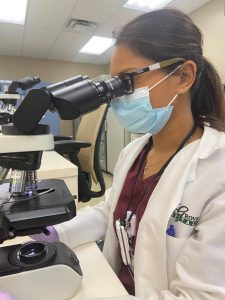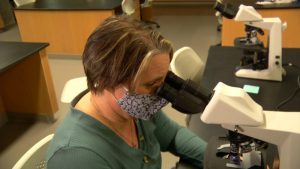COVID-19 Pandemic Exposes Shortage of Medical Lab Workers
Since the start of the COVID-19 pandemic, testing has become a crucial part of trying to get the world back to normal.
It helps to stop the spread of the virus, and saves lives in the process.
“We put a lot of kits together,” said Kayla Kroells, a medical laboratory scientist at Maple Grove Hospital. “Thousands for those tents, and for them to be ran.”
Kroells has a number of responsibilities at the hospital, with one being that she has to process those COVID tests.
“You wouldn’t know how rampant this disease is or this virus is [without the test], and you wouldn’t know when the numbers are actually coming down,” Kroells said. “So without us, you don’t have any data.”

Kayla Kroells is a Medical Lab Scientist at Maple Grove Hospital.
Without the work of the medical lab scientists like Kroells, doctors wouldn’t have the full picture of what’s happening with their patients.
“Lab work is a very essential part of health care,” she said.
Yet while this position seems essential, experts say there’s a seven percent vacancy rate for medical lab workers nationwide. It’s a void that’s become more pronounced since the onset of the pandemic.
North Hennepin, SCSU try to fill the need
“[The pandemic] definitely has made every lab a much busier place to be,” said Cori Fisher, an adjunct professor for the Medical Laboratory Science Program at North Hennepin Community College. “And not just the COVID testing, it’s the testing you do for the patients who are sick with COVID. The volume of testing has gone up tremendously.”
As an adjunct professor, Fisher is doing her part to help local medical labs fill those job openings.
“I really want there to be more people doing this job,” she said. “I don’t think enough people know what it is to be a medical lab tech.”

Cori Fisher is an adjunct professor in the North Hennepin Community College/SCSU Medical Lab Science Program.
Since 2010, North Hennepin has partnered with St. Cloud State University on this Medical Lab Science Program. The way it works is that current laboratory professionals with two-year degrees can get their bachelor’s degree by taking courses one night a week in Brooklyn Park. Students take two classes a semester, and each week they alternate between one class and the other.
And instead of doing lab work in class, the students do their clinical rotations at their place of employment.
“I personally think it’s incredibly rewarding. I love it,” Fisher said.
The degree helps lab professionals climb the career ladder.
“COVID has certainly increased that demand for laboratory personnel,” said Pat Ellinger, from St. Cloud State University.
Ellinger is one of the program faculty for the Medical Laboratory Science Program at St. Cloud State, and she hopes more people consider this career path.
“We are constantly getting calls and emails from employers asking, when are you having more graduates coming out of your programs so that we can hire them,” she said.
“Without the lab, your doctor’s just guessing,” Kroells said.
Kroells is a graduate of the program herself. She says earning the degree opens a lot of doors, and comes with a financial benefit. But above all else, she knows she’s helping other people.
“You are very much behind the scenes, but it’s very rewarding,” she said.


